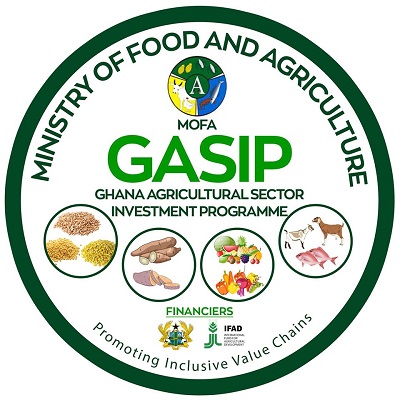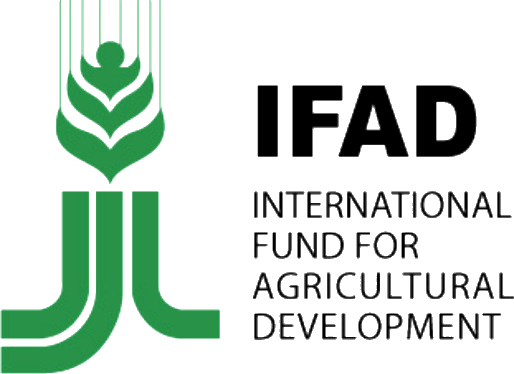
GASIP’s goal is to contribute to sustainable poverty reduction in rural areas of Ghana and its development objective is to enhance the profitability and climate change resilience of agribusinesses and smallholders. The Ministry of Food and Agriculture (MOFA) implements the programme. GASIP is a national programme for a period of six years implementable through two cycles of three years each. The programme became effective in May 2015 and is scheduled for completion on 30 June 2021 and closure on 31 December 2021. A Programme Coordination Unit (PCU) located in Accra supported by four Zonal Coordination Offices (ZCOs) is responsible for overall implementing GASIP. At design GASIP was expected to reach 86,400 farmers by the end of the second cycle, working through 4,000 FBOs organised under value chain clusters. An IFAD loan of US$ 36.6 million and an ASAP grant of US$ 10 million financed the first cycle of the programme.
GASIP approach: GASIP follows a value chain development approach. It assists in developing secured marketing linkages between FBOs and agribusinesses (referred to as value chain drivers). The FBOs and the value chain drivers (VCD) sign agribusiness partnership agreements before the production season whereby the VCDs commit to purchase the crops produced by the FBOs based on quantity, quality and cost parameters agreed in the agribusiness agreements. GASIP supports the implementation of these agribusiness agreements by strengthening the FBOs, providing matching grants to support crop production activities and strengthening value chain infrastructure. GASIP also promotes the adoption of climate change resilient practices.
Achievements: The latest GASIP supervision mission (SM) in December 2019 has noted that the programme has overcome the initial bottlenecks and made rapid progress. The SM’s findings suggest that GASIP has partnered with 53 VCDs which in turn have partnered with 1,200 FBOs mainly for producing rice, maize, soya, cassava and some vegetables across all the major agroclimatic zones in the country. The short time in which GASIP established these partnerships between the different value chain stakeholders is commendable. GASIP has supplied USD 13.6 million as matching grant support to the beneficiaries to ensure their access to quality and timely inputs through the VCDs. The VCDs have purchased and provided high-quality crop production inputs to 47,509 individual FBO members. All the VCDs have signed written agreements and action plans with the FBOs with the commitment to purchase the produce after harvest. The partnerships between the VCDs and the FBOs are based on diverse models, e.g. out-grower model, captive farming models, FBO-GCX linkage brokering model. The beneficiary farmers have received improved and timely inputs through the VCDs in coordination with their FBOs.
GASIP’s Crop Yield Surveys have suggested that the beneficiaries have experienced over 70% increase in yield due to good quality and timely access to the inputs followed by regular technical guidance by the VCDs and government extension staff during the season. The SM also reports that GASIP has achieved 60% financial progress almost entirely in a single year (2019) indicating the high level of responsiveness and demand for GASIP services by FBOs through private sector VCDs. Also, during the turnaround period, GASIP has reasonably addressed the IFAD mainstreaming priorities by engaging women (34%) and youth (45%) in the VCD partnerships. Through these results, GASIP has developed a favourable setting for consolidation and scaling up of the achievements and higher levels of poverty reduction in the programme area.
GASIP has developed a clear strategy and action plan for building the capacity of the FBOs, including the development and signing of Memoranda of Understandings (MoUs) with District Departments of Agriculture and MOFA Directorates, for Agricultural Extension Agents to receive training and to organize cascade on-field trainings to smallholder farmers and VCDs. The capacity building activities have started on some districts.
Again, in 2019, GASIP signed cooperation agreement with GIZ - Competitive Africa Rice Initiative Programme (CARI) and rolled-out capacity building activities on rice parboiling for 1,200 women rice processors to enhance market access. GASIP again leveraged on the expertise of the private sector and signed an implementation agreement with Nestlé, leading to capacity building for FBOs and Agric Extension Agents on food safety and quality in the end-to-end crop production process, in anticipation of FBOs getting access to high volume but exceptional quality-conscious industry markets. This led to the training of 120 AEAs in a ToT and 20,000 SHFs in cascaded training. GASIP also collaborated with the Ghana Commodity Exchange (GCX) to enable VCDs and SHFs to participate fully on the GCX electronic trading platform. In all, 6 VCDs were integrated and 5,600 SHFs subscribed to receiving daily market prices from the GCX through their mobile phone devices.
A total of 53 ha Conservation Agriculture demonstration/Learner plots and 486ha farmer fields have been established reaching 1,320 smallholder farmers directly. These SHFs has so far received training on various Climate Smart Agriculture technologies and weather information services. The programme successfully installed ten (10) automatic weather stations across the programme beneficiary Districts in the northern zone. The installation of the automatic weather stations provided smallholder farmers with real-time weather information services.





